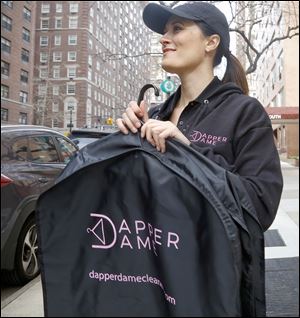
When stores go kaput, owners ask: Now what?
4/21/2017NEW YORK — When small or independent retailers post “Going Out of Business” signs, many ask themselves, now what? That may mean trying again — or forging ahead on a completely different career path.

Reilly Starr founded Dapper Dame, a dry cleaning and laundry business, after winding down her previous retail store selling athletic wear for women.
Reilly Starr and her business partner had opened Naked Sports Gear, a Manhattan store that sold athletic wear for women, in 2011. They were successful, but faced increasing competition and high rent and other overhead. Three years ago, an underwear company sued over the word “naked.” Ms. Starr and her partner fought it until late last year. Then, believing the workout wear fad was fading, they accepted a cash settlement and wound down the business.
“We were part of a trend and we seized that trend at the right time, and we rode it out as long as we could,” Ms. Starr says. But she didn’t see opening another store as an option: “Brick and mortar is the worst thing you can do in New York.”
Her next move was instead starting a service company, a dry cleaning and laundry business called Dapper Dame targeting women. She launched a month ago without a storefront; using an app to connect with customers and contracting with a wholesale dry cleaning company to do the work.
Ms. Starr had the idea for a women’s dry cleaner in her head for some time. That kind of thinking about “what’s next” is a strategy that even successful storeowners should be using, says Bob Phibbs, CEO of the Retail Doctor, a consulting company based in Coxsackie, N.Y. He points out that stores are closing in cities, malls, and small local shopping centers.
“You need to have a Plan B, or at least be open to what else could be out there,” Mr. Phibbs says.
Stores fail for many reasons, and retailers of all sizes have suffered because people are shopping more online and less in physical stores. In the past few months, big department store chains like Macy’s and Sears have said they’ll close some stores, and clothing sellers like the Limited have shut down completely. Small retailers can be more vulnerable than the bigger players because they don’t have the big cash reserves or negotiating power with vendors.
Some business owners who close their stores but want to stay in retail transition to online-only selling. Leigh Meadows-McAlpin had a furniture and home design business for nearly 15 years on King Street, a shopping mecca in Charleston, S.C. As the years went by, overhead including rent kept rising. She ended up creating a new interior design business.
Robert Garcia had to wrestle with what to do next a decade ago, when the rent for his patio umbrella store in Hialeah, Fla., more than tripled from $1,200 a month to $3,800 in just 18 months. He tried to find a new space, but says “there wasn’t anything even remotely close” that he could afford. Mr. Garcia considered getting out of retailing entirely.
“I went through all the philosophic questions in my head in the space of two to three days,” he says. “Do I go work for somebody else after owning my own business? Part of that makes you feel like a failure.”
He decided to try selling umbrellas online. The iPatioUmbrella.com site allows him to draw on his retailing experience, and he doesn’t have the threat of suddenly soaring overhead costs.